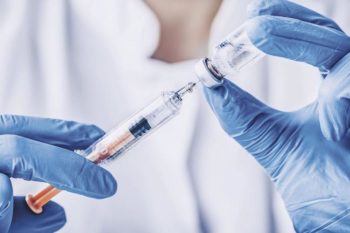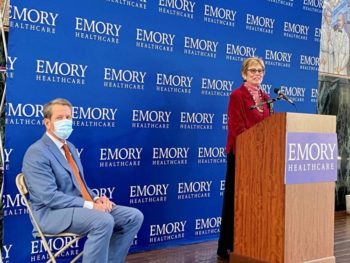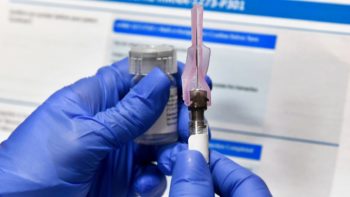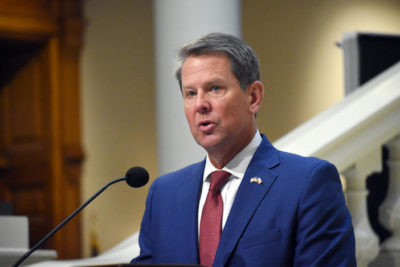Georgia reported 145 COVID-related deaths Tuesday, the state’s highest single-day total recorded since the pandemic began.
More than 9,000 new infections were also reported Tuesday, along with 435 new hospitalizations. The overall number of COVID hospitalizations currently has hit 5,700, continuing its steady, record-breaking climb.
These grim statistics coincide with frustrating waits for Georgia seniors and others who need COVID vaccinations. Georgia had the worst vaccination rate in the nation as of Monday, according to CDC data, though state officials pushed back against the federal agency’s figures.

The CDC statistics Tuesday showed that Georgia’s rate had improved to 1,607 doses administered per 100,000, up from 1,346 on Monday. The state rate is now better than those of Arkansas, South Carolina and Alabama.
Numerous Public Health departments this week have experienced a flood of calls and emails asking for appointments to get shots. Medical providers, too, are feeling the tremendous demand.
On Monday, Gov. Brian Kemp opened up vaccinations to seniors, firefighters, law enforcement officers and first responders as supply is available. They join health care workers and staff and residents of long-term care facilities in the initial target group.
Georgia has about 1.3 million residents 65 and older.
The death total reported Tuesday surpassed the previous high of 129 set in August, according to Department of Public Health figures.
“We are in a true crisis,’’ said Dr. Harry Heiman, a Georgia State University public health expert. “Not only are we seeing surging COVID cases and hospitalizations, but also, now the predicted and predictable surge in deaths. The tragedy is that much of this was preventable.’’

He called on state officials to take stronger steps to reduce spread in high-risk settings like bars, nightclubs, and indoor restaurants. “We must also address the higher risk of infection with school reopening and the need to have policies in place mandating masks and ensuring appropriate case identification, contact tracing and quarantine in the event of COVID cases in schools.’’
Kemp has so far resisted taking further steps to fight the surge, and while encouraging mask use, has declined to make it a requirement.
State challenges federal figures
Kemp, in a Tuesday news conference, said the state has made “great progress’’ on vaccinations, but noted that the supply of vaccine is limited. Georgia gets about 120,000 doses a week, and about 40,000 of them go to long-term care facilities.
The governor sharply warned large medical providers not to hold back second doses of vaccine. Both COVID vaccines being used in this country — one made by Pfizer and the other by Moderna — require two doses.

“We expect [providers] to be administering those doses quickly and as safely as possible,’’ he said. If that does not happen, Kemp said, the state will take possession of those vials. “If it takes me firing up my pickup truck and doing it myself, so be it.”
Phone lines will be busy, and websites will crash, Kemp said. “I know [Georgians] are frustrated. I am, too, in many ways.’’
The state Public Health commissioner, Dr. Kathleen Toomey, said the official reporting on vaccination numbers has been hampered by a technical problem between the agency’s immunization system and the CDC system. She added that the state vaccination registry can be unwieldy for medical providers.
Hospital officials told GHN on Monday that facilities were having trouble inputting the vaccine data.
Ryan Loke, a health policy adviser to Kemp, said he questioned the latest CDC data, asserting that the state has administered tens of thousands more doses than the federal agency reported.

To speed vaccine distribution, the state is planning regional mass vaccination events. And Kemp discussed reaching out to the private sector for help in getting people vaccinated.
Also Tuesday, U.S. Health and Human Services Secretary Alex Azar said the federal government will no longer hold back coronavirus vaccine doses it has kept in reserve. And HHS is asking states to open vaccinations to people 65 and older and people with chronic conditions who are at higher risk of severe disease.
Other elements of the plan include giving states the next two weeks to prove they really need all of the vaccine doses they’ve been getting — or risk receiving fewer in the future as part of a redistribution move.
When asked about this two-week window, Kemp said the state was making substantial progress on the vaccine reporting lag. He also noted that the HHS guidance could change with the new Biden administration coming to power next week.
Meanwhile, Georgia has climbed into the top 10 states in per capita COVID cases over the past week, with 90 per 100,000 population, according to the New York Times.
“Cases, hospitalizations, and ICU occupancy are at record highs, with no sign of abatement,’’ said Dr. Melanie Thompson, an Atlanta physician. “Staff are exhausted, and insufficient for the coming onslaught.
“We can be sure that this is not the worst of what we will see, especially as health systems buckle,’’ she added. “The governor’s plan to not do anything differently is a recipe for disaster, and we are getting a taste of that today.’’

